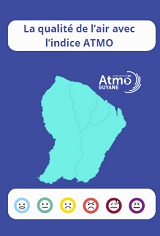Blada.com
vendredi 04 juillet
Boîtes aux lettres
Courrier des lecteurs
Petites annonces
Emploi / Formation
Covoiturage
Infos citoyennes
Infos citoyennes
07/09/20
Action en justice contre l'ouverture de l'usine de cyanuration en Guyane
 Exploitation sans autorisation, non-respect des prescriptions environnementales... depuis 2007, les installations d’Auplata situées à Dieu-Merci, en Guyane, enchaînent les non-conformités. Pourtant, par des régularisations successives, le Préfet de Guyane a, coup après coup, permis à Auplata d’exploiter son site. Il vient désormais de donner son aval à la société pour traiter son or au cyanure... Face aux problèmes récurrents observés sur le site et au danger que représente la mise en service de cette usine, les associations France Nature Environnement et Guyane Nature Environnement saisissent le Tribunal administratif de Cayenne.
Exploitation sans autorisation, non-respect des prescriptions environnementales... depuis 2007, les installations d’Auplata situées à Dieu-Merci, en Guyane, enchaînent les non-conformités. Pourtant, par des régularisations successives, le Préfet de Guyane a, coup après coup, permis à Auplata d’exploiter son site. Il vient désormais de donner son aval à la société pour traiter son or au cyanure... Face aux problèmes récurrents observés sur le site et au danger que représente la mise en service de cette usine, les associations France Nature Environnement et Guyane Nature Environnement saisissent le Tribunal administratif de Cayenne.
Le démarrage d’une usine sur fond d’irrégularités approuvé par la Préfecture de Guyane
Tout commence en 2007 lorsque l’inspection des installations classées constate que la société extrait et traite illégalement par gravimétrie (procédé classique) des minerais d’or sur son site Dieu-Merci, en plein cœur de la forêt amazonienne. Au-delà du caractère illégal des installations, de nombreuses non-conformités liées aux normes environnementales et à la sûreté du site sont identifiées. Huit ans plus tard, après une période d’inertie et des sanctions financières, la société obtient en 2015 la régularisation administrative de son usine de traitement par gravimétrie. Par la même occasion, Auplata obtient l’autorisation de construire une usine de cyanuration, et ainsi accéder à la technique d’extraction à échelle industrielle.
Or, peu avant le démarrage de la phase test prévue en septembre 2018, les services de l’Etat constatent à nouveau des non-conformités : des importantes modifications par rapport au projet initial, avec notamment un design de l’usine très différent de celui prévu par l’arrêté de 2015. Malgré cela, la préfecture avalise en novembre 2019 ce dangereux projet en conditionnant le démarrage de l’usine à de simples prescriptions complémentaires, tout en autorisant une augmentation significative des quantités de cyanure stockées.
C’est ainsi que 13 ans après le constat de son exploitation illégale, la société Auplata, cotée en bourse, a fièrement annoncé le lancement dès 2020 de la première usine de cyanuration sur le sol guyanais. Par ailleurs, la société a pu obtenir en mai dernier un crédit d’impôt du gouvernement de 5,8 millions d’euros.
Un procédé dangereux dans des milieux très sensibles, pour quelques kilos d’or
Le cyanure est utilisé dans l’industrie aurifère malgré ses effets potentiellement catastrophiques et irréversibles sur l’environnement. C’est un composé chimique extrêmement toxique à tous ses stades de manipulation (transport, stockage, utilisation). Rejeté dans le milieu naturel, il provoque instantanément l’asphyxie des organismes vivants ainsi qu’un violent déséquilibre des écosystèmes. Cette technologie a d’ailleurs manqué d’être interdite dans l’industrie aurifère, d’abord par une résolution votée par le Parlement européen en 2010, puis une proposition de résolution à l’Assemblée Nationale en 2018 et une proposition de loi en 2019 au Sénat.
Le site de Dieu-Merci se trouve à 5 kilomètres en amont de la Réserve Naturelle Nationale de la Trinité, 3ème plus grande réserve naturelle terrestre de France. Plusieurs espèces animales et végétales remarquables ont d’ailleurs été répertoriées sur ce secteur. Avec les effets du changement climatique qui amplifient l’intensité et la fréquence des épisodes pluvieux, le risque de rupture de digue est fort en Guyane. Une catastrophe sur l’usine d’Auplata aurait des conséquences désastreuses pour ces milieux.
« Lorsque l’on sait que depuis 25 ans, une trentaine d’accidents liés aux résidus cyanurés ont été répertoriés, notamment chez notre voisin brésilien, et que ce même procédé a fait l’objet de vives oppositions lors du débat public de Montagne d’Or, il est incompréhensible que la Préfecture de Guyane autorise le démarrage de cette industrialisation dans de telles conditions, mettant à risque les milieux naturels et la santé des populations » s’indigne Manouchka Ponce, coordinatrice de Guyane Nature Environnement.
Une action contentieuse pour mettre à l’arrêt ce projet destructeur
« L’enjeu est de taille : il s’agirait de la première usine de cyanuration sur le sol guyanais ! Laisser ce projet se maintenir malgré les défaillances récurrentes et les risques environnementaux, c’est laisser la porte ouverte à l’industrie minière en Guyane en dépit des exigences environnementales. En effet, ce projet est observé de près par les multinationales qui investissent sur le territoire, comme les promoteurs du projet Montagne d’Or ou de celui d’Espérance, et qui envisagent l’utilisation de ce même procédé », explique Ginette Vastel, pilote du réseau Risques et Impact Industriels de France Nature Environnement.
Face à ce risque imminent pour les écosystèmes amazoniens, Guyane Nature Environnement et France Nature Environnement contestent devant le juge administratif la légalité de l’autorisation de 2015 et de l’arrêté complémentaire de 2019. Nos associations entendent ainsi obtenir la mise à l’arrêt de ce projet destructeur et peser dans les discussions autour de l’interdiction pure et simple du procédé de cyanuration dans l’hexagone et en Outre-mer.
Operation without authorization, non-compliance with environmental regulations ... since 2007, Auplata’s facilities located in Dieu-Merci, in French Guiana, have had a series of non-conformities. However, through successive regularizations, the Prefect of French Guiana has, blow after blow, allowed Auplata to operate his site. It has now given its approval to the company to treat its gold with cyanide ... Faced with the recurring problems observed on the site and the danger posed by the commissioning of this plant, the France Nature Environnement and Guyane Nature Environnement associations took action. the Cayenne Administrative Court.
The start-up of a factory against a background of irregularities approved by the Prefecture of French Guiana
It all began in 2007 when the Inspectorate of Classified Installations found that the company illegally extracts and processes gold ores by gravimetry (a classic process) at its Dieu-Merci site, in the heart of the Amazon rainforest. Beyond the illegal nature of the facilities, many non-conformities related to environmental standards and site safety are identified. Eight years later, after a period of inertia and financial sanctions, the company obtained in 2015 the administrative regularization of its gravimetric treatment plant. At the same time, Auplata obtains the authorization to build a cyanidation plant, and thus gain access to the extraction technique on an industrial scale.
However, shortly before the start of the test phase scheduled for September 2018, the State services again noted non-conformities: significant changes compared to the initial project, with in particular a design of the plant very different from that provided for in the 2015 decree. Despite this, the prefecture endorsed this dangerous project in November 2019 by making the start-up of the plant dependent on simple additional prescriptions, while allowing a significant increase in the quantities of cyanide stored.
Thus, 13 years after the discovery of its illegal exploitation, the listed company Auplata proudly announced the launch in 2020 of the first cyanidation plant on Guyanese soil. In addition, the company was able to obtain a government tax credit of 5.8 million euros last May.
A dangerous process in very sensitive environments, for a few kilos of gold
Cyanide is used in the gold industry despite its potentially catastrophic and irreversible effects on the environment. It is an extremely toxic chemical compound at all stages of handling (transport, storage, use). Rejected into the natural environment, it instantly causes the suffocation of living organisms and a violent imbalance of ecosystems. This technology has also failed to be banned in the gold industry, first by a resolution passed by the European Parliament in 2010, then a motion for a resolution to the National Assembly in 2018 and a bill in 2019. in the Senate.
The Dieu-Merci site is located 5 kilometers upstream from the National Nature Reserve of the Trinity, the 3rd largest terrestrial nature reserve in France. Several remarkable animal and plant species have also been listed in this sector. With the effects of climate change amplifying the intensity and frequency of rain episodes, the risk of dike rupture is high in French Guiana. A disaster at the Auplata plant would have disastrous consequences for these communities.
“When we know that for 25 years, around thirty accidents linked to cyanide residues have been listed, in particular in our Brazilian neighbor, and that this same process was the subject of strong opposition during the public debate of the Golden Mountain, it is incomprehensible that the Prefecture of French Guiana authorizes the start of this industrialization under such conditions, putting natural environments and the health of populations at risk, ”says Manouchka Ponce, coordinator of Guyane Nature Environnement.
Litigation to stop this destructive project
"The stakes are high: this would be the first cyanidation plant on Guyanese soil! Allowing this project to continue despite recurring failures and environmental risks is to leave the door open to the mining industry in French Guiana despite environmental requirements. Indeed, this project is closely observed by multinationals investing in the territory, such as the promoters of the Golden Mountain or that of Esperance, and who are considering the use of this same process ”, explains Ginette Vastel, pilot of the Industrial Risks and Impact network of France Nature Environnement.
Faced with this imminent risk for the Amazonian ecosystems, Guyane Nature Environnement and France Nature Environnement are contesting the legality of the authorization of 2015 and of the complementary decree of 2019. Our associations thus intend to obtain the shutdown of this destructive project and weigh in the discussions around the outright ban on the cyanidation process in France and overseas.
Raccourcis


passer une petite annonce

passer une annonce de covoiturage


passer une annonce d’emploi







associations, postez vos actualités

participez au courrier des lecteurs
La Guyane c’est ici
La qualité de l’Air avec
ATMO
Photothèque

Lancements 2022
Vol 259 Ariane 5




